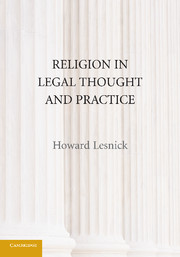Book contents
- Frontmatter
- Contents
- Preface
- I INTRODUCTIONS
- II MORAL OBLIGATION AND RELIGIOUS BELIEF
- III RELIGION AND SOME CONTEMPORARY MORAL CONTROVERSIES
- IV THE INTERACTION BETWEEN RELIGION AND THE SECULAR LAW
- V RESPONDING TO RELIGIOUS DIVERSITY
- VI RELIGIOUSLY GROUNDED MORAL DECISION-MAKING IN PROFESSIONAL LIFE
- Copyright Permission Acknowledgments
- Authors of Works Reprinted
- Scriptural Passages
- Index
V - RESPONDING TO RELIGIOUS DIVERSITY
Published online by Cambridge University Press: 05 June 2012
- Frontmatter
- Contents
- Preface
- I INTRODUCTIONS
- II MORAL OBLIGATION AND RELIGIOUS BELIEF
- III RELIGION AND SOME CONTEMPORARY MORAL CONTROVERSIES
- IV THE INTERACTION BETWEEN RELIGION AND THE SECULAR LAW
- V RESPONDING TO RELIGIOUS DIVERSITY
- VI RELIGIOUSLY GROUNDED MORAL DECISION-MAKING IN PROFESSIONAL LIFE
- Copyright Permission Acknowledgments
- Authors of Works Reprinted
- Scriptural Passages
- Index
Summary
There is a sense in which the entire book deals with the problem of responding to religious diversity (the title of this part), while Chapters 5 (“What Are the Bases of Resistance to Religiously Grounded Morality?”) and 13 (“Religiously Grounded Morality and the Reach of Public Law”) address specific aspects of the issue. Nonetheless, it seems important to engage more frontally with its historical, theological, and philosophical manifestations.
Chapter 16 addresses the fundamental issues of its subtitle: the interplay among religion, truth, and pluralism. The questions are as simple to state as they are difficult to unpack:
– Isn't religious belief at least in substantial part about a claim to know and assert the truth about something very important?
– Isn't religious commitment therefore incompatible with acceptance of the legitimacy of pluralism?
Chapter 17 attempts to engage with a problem that in some ways would be simply an aspect of the broader question but for (in the words of its title) “The Legacy of History.” Its importance, to both Jews and Christians, is only enhanced by the fact that the generation now coming to maturity is, to an amazing degree, largely unaware of that history. I do not attempt even to summarize it, but try to examine some of the complexities that both traditions have faced during the last half-century as they have sought, separately and together, to transcend that legacy. The difficulties are theological as well as historical, and in my judgment need to be better understood.
- Type
- Chapter
- Information
- Religion in Legal Thought and Practice , pp. 487 - 488Publisher: Cambridge University PressPrint publication year: 2010



